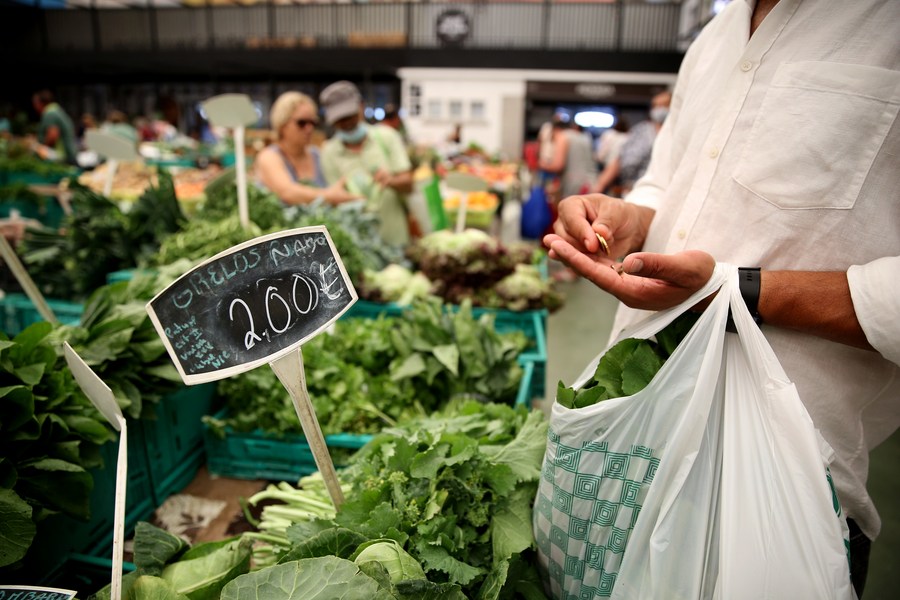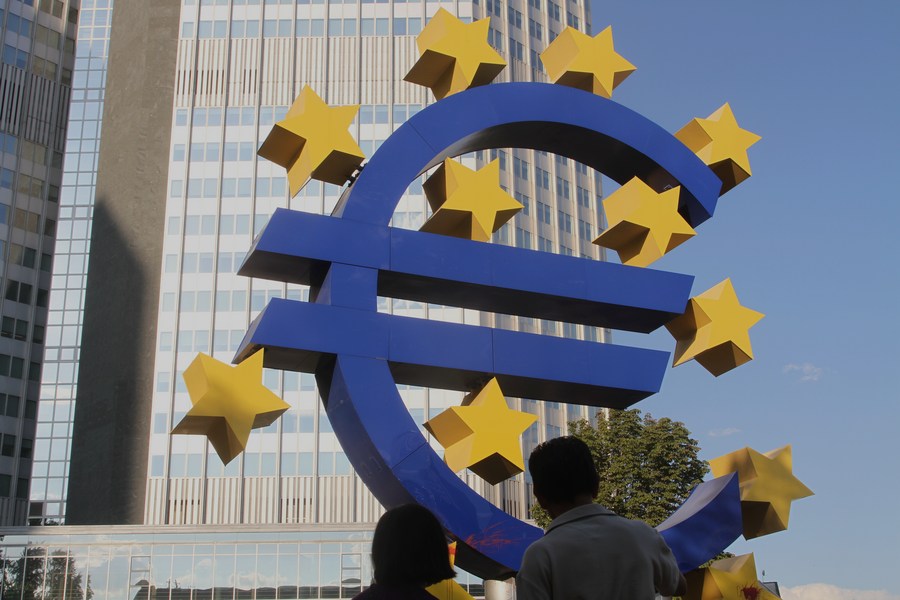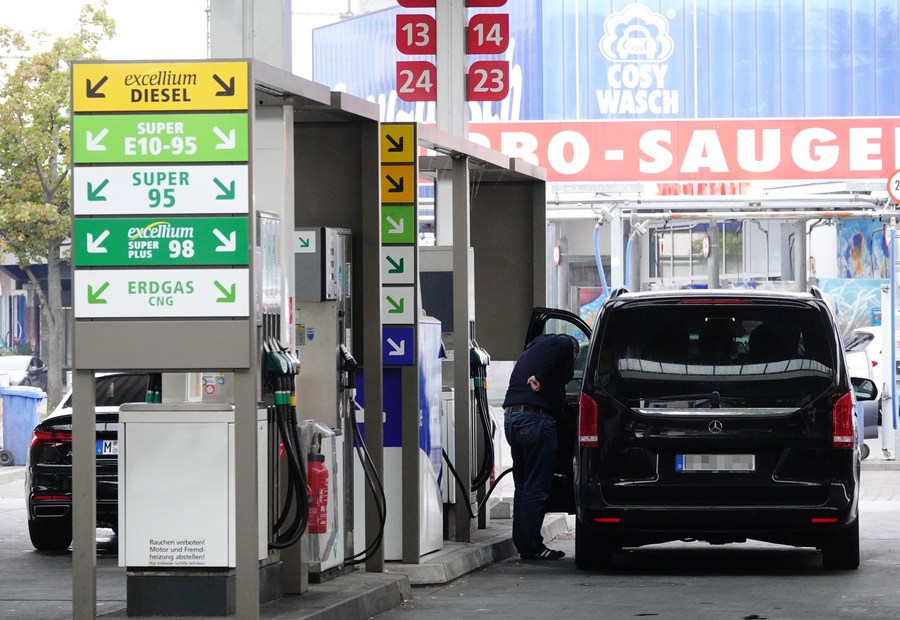* The inflation in the euro area hit a new record high of 9.1 percent in August, attributed mainly to price spikes of energy products and food.
* Bert Colijn, a senior economist at ING, sees no hope of inflation coming down in the near future in Europe as the energy squeeze and drought will continue to wreak havoc in the coming months.
* The ECB gave the clearest indication that it will not compromise in its fight against inflation on Sept. 8 with an unexpectedly 75-basis-point rate hike, and it held out the prospect of further rate hikes in the coming months.
* Observers are concerned that a rapid normalization of the ultra-loose monetary policy pursued for years could slow down the economy, which is already struggling with supply bottlenecks and reduction of gas supplies.
FRANKFURT, Sept. 19 (Xinhua) -- Inflation in the euro area has been hovering at alarmingly high levels for a lengthened period of time, attributed mainly to price spikes of energy products and food.
The European Central Bank (ECB), which is mandated to keep the price stable in the euro area, raised interest rates more aggressively to rein in the rampant inflation at the risk of plunging the European economy into recession.
INFLATION STAGGERINGLY HIGH
The inflation in the euro area hit a new record high of 9.1 percent in August, according to data published by the statistical office of the European Union (EU). The three Baltic countries, Estonia, Latvia and Lithuania, are suffering from the steepest price hikes with a 20 percent plus increase year on year in August.
With a year-over-year inflation rate of 38.6 percent, energy prices remain the main factor driving this growth, followed by prices of food, alcohol and tobacco with an increase of 10.6 percent in August. Electricity prices in some EU countries are even tenfold those of the same period last year.

Customers shop at a market in Cascais, Portugal, on July 13, 2022. (Photo by Pedro Fiuza/Xinhua)
Inflation weighs on wages in the euro area and has led to reduced purchasing power of households.
The monthly gauge from the European Commission indicated that consumer confidence in the Euro Area increased to minus 24.9 in August, slightly better than July but still around the lowest level in history in Europe. While demand remains weak, some manufacturers in Europe are forced to slash production, resulting in a decrease of industrial output in Europe.
The weather has not come to Europe's help. Severe drought in Europe this year has reduced water levels of some of the major waterways in the area, compounding price hike pressures of transportation as more goods have to be shipped by rail which is more expensive. Furthermore, the reduction in agricultural output caused by harsh climate conditions is expected to spread to other food products and heighten inflationary pressures on food prices, according to experts.

A view of Cijara reservoir in Extremadura, Spain, Aug. 15, 2022. Lack of rain has left water volumes in its reservoirs at less than 40 percent of their storage capacities -- 20 percent below the average level for this time of the year. (Xinhua/Meng Dingbo)
Bert Colijn, a senior economist at ING, a Dutch multinational banking and financial services corporation, sees no hope of inflation coming down in the near future in Europe as the energy squeeze and drought will continue to wreak havoc in the coming months.
It is expected that the natural gas price will remain elevated in Europe since European countries have to replenish their stock by purchasing more expensive liquefied natural gas (LNG) from the United States and other countries, and the concern is mounting about the stock level of natural gas in Europe. Inflation in Europe is likely to go higher in the future.
ECB'S BIGGEST MOVE
The ECB gave the clearest indication that it will not compromise in its fight against inflation on Sept. 8 with an unexpectedly 75-basis-point rate hike, the largest increase made by the bank in history.
At the same time, the ECB held out the prospect of further interest rate hikes in the coming months to curb spiraling inflation, which is becoming broad, entrenched and "is likely to stay above target for an extended period."
Another concern for ECB is the weak euro, which has contributed to rising inflation, according to ECB President Christine Lagarde, who stressed that the central bank would monitor the movements of the euro "very carefully." Most recently, the euro has fallen below parity with the U.S. dollar for several times and was trading at its lowest rate in almost 20 years. A weak euro makes imports more expensive and fuels inflation in the euro area because crude oil and many commodities are paid for in dollars.

People stand in front of the Euro sculpture in Frankfurt, Germany, on Aug. 22, 2022. (Xinhua/Shan Weiyi)
Some economists called on the ECB to follow up its decision to raise interest rates whereas some others find it controversial, doubting interest rate hike would help tempering the current situation.
"Further interest rate hikes must follow so that people can continue to believe the ECB and its promise of stable prices," said Helmut Schleweis, president of German Savings Banks and Giro Association.
Emanuel Moench, a professor of financial and monetary economics at Frankfurt School of Finance and Management, noted that much of the inflation is due to supply chain bottlenecks and higher energy prices. "These are developments that the central bank's interest rate policy can't really influence."
AT RISK OF RECESSION
Still, observers are concerned that a rapid normalization of the ultra-loose monetary policy pursued for years could slow down the economy, which is already struggling with supply bottlenecks and reduction of gas supplies.
The economic outlook for the euro area is gloomy, with economic growth likely to slow significantly, said Lagarde. The ECB expects the euro area's annual average real GDP growth is expected to stand at 3.1 percent in 2022, to slow down markedly to 0.9 percent in 2023 and to rebound to 1.9 percent in 2024.

A man fuels a vehicle up at a gas station in Berlin, Germany, Sept. 8, 2022. (Xinhua/Ren Pengfei)
Fritzi Koehler-Geib, chief economist at Germany's state-owned development bank KFW, noted that the economy could continue to suffer as some sacrifices and necessary demand-side adjustments are required by households, companies and the state.
The level of ECB's monetary tightening threatens to squash Europe's economic activity, which is already under pressure from the energy crisis, said the global investment management company BlackRock in a note last week, adding that "energy crisis will spur a recession in Europe".
"The ECB will keep up its aggressive rate hikes through the end of 2022," but then stop once it realizes the economy is suffering significantly, said analysts at BlackRock. (Video reporters: Sun Xinjing, Shan Weiyi, Wang Pingping, Hu Xiaobing; video editors: Jia Xiaotong, Yin Le, Zhang Yuhong, Ma Ruxuan)■












